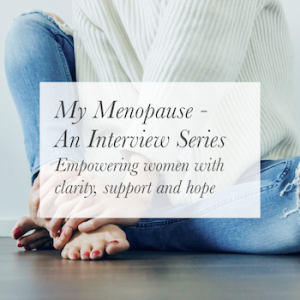Earlier this year I discovered I was in peri-menopause. Only glitch? I was only 43.
I was experiencing a myriad of physical ailments and discomforts – painful acne, horrific night sweats, mood swings, brain fog, lack of inspiration, super heavy and irregular periods, tiredness and a frighteningly low mood which was starting to feel like depression.
It never occurred to me that perhaps it was all linked until I opened up to some female friends who said (I initially thought jokingly), “Perhaps you are in perimenopause?”
I felt overwhelmed. How could this be happening? Surely menopause was something that began after turning 50? It wasn’t on my radar at all and I’d never even heard the term, ‘perimenopause’.
{Perimenopause is the time leading up to achieving menopause when your hormone levels start to shift. That period of time can be anything from a few months to several years. Eventually your periods will stop and once you’ve not menstruated for a full 12 months you have officially reached menopause}
My conditioning had me believe that menopause was a horrible nightmare and my initial response was to start feeling unattractive, undesirable, old and on a downhill slope – all of which heightened the experience of my symptoms. I felt even worse!
As a transformational self-love coach, author and speaker it occurred to me that I wasn’t responding in a conscious, empowered or masterful way to a very natural part of life.
To respond in the way that I was is the experience of most women and that bothered me.
In the same way that puberty, a girl starting her period and a woman having a baby is generally socially accepted and spoken about openly, surely it should be the same for menopause? Why did it feel so shameful and disempowering to realise I was reaching that phase of my womanhood?
I decided then and there to make my experience of menopause positive and life affirming. I was not going to allow my conditioning to create my experience. I intended to get back in the drivers seat and stop giving my power away.
Then it dawned on me. When my mum committed suicide she was 49. She would have been in perimenopause.
They say that a woman’s experience of perimenopause can often be very similar to her Mum’s. I never talked to mum about menopause – I was only 22 when she died so was more interested in travelling and boys and besides, menopause simply wasn’t open for discussion.
I remember mum occasionally experiencing hot flashes during the day which she sort of laughed away. She was also getting the occasional cystic spot on her jawline but mostly I remember her not being happy – life seemed so hard for her, like she was always battling with something internal.
Depression, anxiety and mood swings are very common in perimenopause and from my personal experience earlier this year, it’s a scary and lonely place to be when you don’t understand why you suddenly feel so low. Information as they say is power and while I had no clue what was going on in my body, I felt worse and worse every day. I can see now that this would have been my mum’s experience.
She was diagnosed as clinically depressed in her early 40’s around the time she was going through a divorce with Dad. Therapy and anti-depressants were prescribed. At 43 she attempted suicide. 5 years later she succeeded.
{Over 60 percent of divorces are initiated by women in their 40s, 50s or 60s — the menopause years — according to a recent survey conducted by AARP Magazine}
The dots began to join and I realised that Mum had probably experienced what I was going through but it was never diagnosed. Instead she spiralled into a dark and misunderstood place which not only affected her marriage, it had her lose her lust for life.
{The age group for women with the highest suicide rate per 100,000 in the U.K is 50-54. The average age of menopause is 51}
The day I decided that I would own the natural shifts in my body and not give in to societal conditioning I started to reach out to experts for information.
I realise that I am a little unusual. Most women would go to their GP first for advice on what to do. My first step was to line up 18 experts and interview them all and make it available publicly.
I wanted the best advice and I wanted to help other women as a way of honouring my Mum.
I spoke to expert after expert – the awareness and education was empowering and that alone had things start to feel so much better for me.
My mum didn’t have access to the resources, advice and information that are now available. Menopause was the white elephant in the room. It was swept under the carpet and was deemed an embarrassment that couldn’t pass by fast enough.
I desired to embrace the experience of menopause and to learn how to take care of myself in a way that I knew would be totally unique to me. I wanted to learn how to move through it in a way that had me feel in charge, hopeful, feminine and supported.
I’ve come to discover that this time of life has the potential to be the most empowering rite of passage. It’s also a powerful opportunity for a women to know and love herself because her body is literally asking her to finally learn how to put herself first in order to experience her hormonal shifts with ease.
At this time of life a woman is being invited to nurture herself in the same way that she has nurtured and prioritised her husband, children, career and more for many years.
I’m pleased to report that my experience of perimenopause has shifted dramatically! Awareness, education, expert support, some simple dietary and exercise shifts plus a new supplement regime have combined to have me feeling so much better.
I am finding my own way to navigate perimenopause and I am keen for other women to find their way too because 100% of women will go through it and we will all have our own unique experience and set of symptoms.

‘My Menopause – An Interview Series’ is now available as a free resource to support women who :
- are wondering if perhaps they are in perimenopause;
- definitely know they are in perimenopause;
- want to know how to manage perimenopause – to feel supported and to reduce overwhelm (in advance of starting perimenopause);
- desire to feel empowered and optimistic about this natural life transition
The international experts featured in this series range from medical practitioners to nutritional experts to spiritual teachers. It’s a holistic and well rounded curation of interviews intended to empower you with awareness, solutions, practical tips, tools and alternative ways of viewing and thinking about menopause.
For access to all interviews, check out: https://theschoolofself.love/my-menopause

